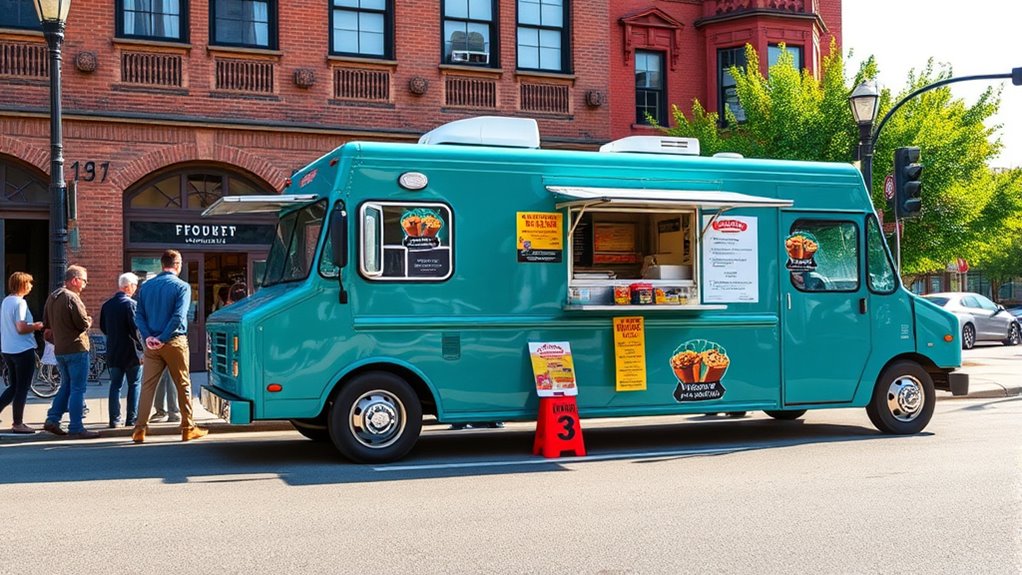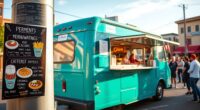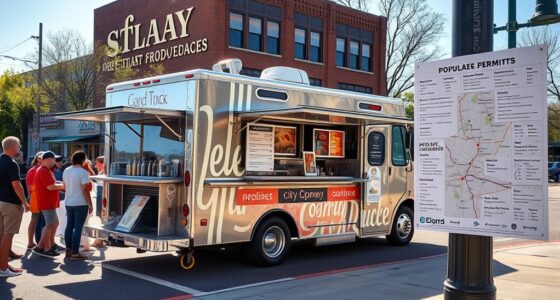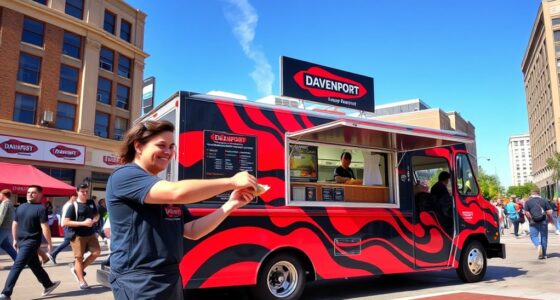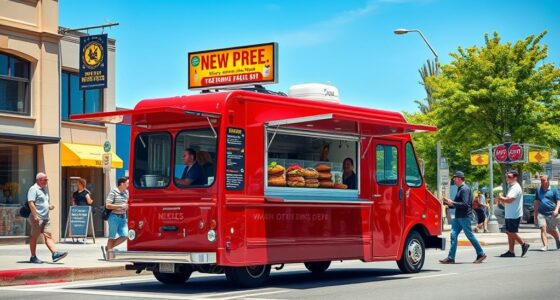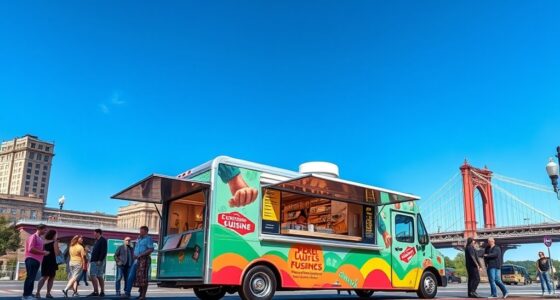To open a food truck in Spokane, you need to secure permits from SRHD, including a Temporary Food Establishment Permit and possibly a commissary agreement, along with licensing from the city and L&I. Startup costs range from $20,000 to $150,000, covering truck, equipment, and supplies. Location is key—think downtown, parks, or near Gonzaga University—and a well-planned menu with appealing, quick-to-serve items helps attract customers. Smart marketing on TikTok and Instagram boosts visibility; continue exploring for helpful tips.
Key Takeaways
- Obtain necessary permits including Spokane’s Temporary Food Establishment, Mobile Food Vendor, and health inspections from SRHD and L&I.
- Budget $20,000–$150,000 for truck purchase, equipment, inventory, signage, and permits, plus ongoing operational costs.
- Focus on high-foot-traffic locations like Riverfront Park, downtown office corridors, Gonzaga University, and event venues.
- Develop a menu with quick prep times, seasonal ingredients, clear allergen labeling, and signature plus rotating items.
- Use social media platforms like TikTok and Instagram Reels for engaging content, location updates, and customer interaction to boost sales.
Navigating Permits and Licensing Requirements in Spokane
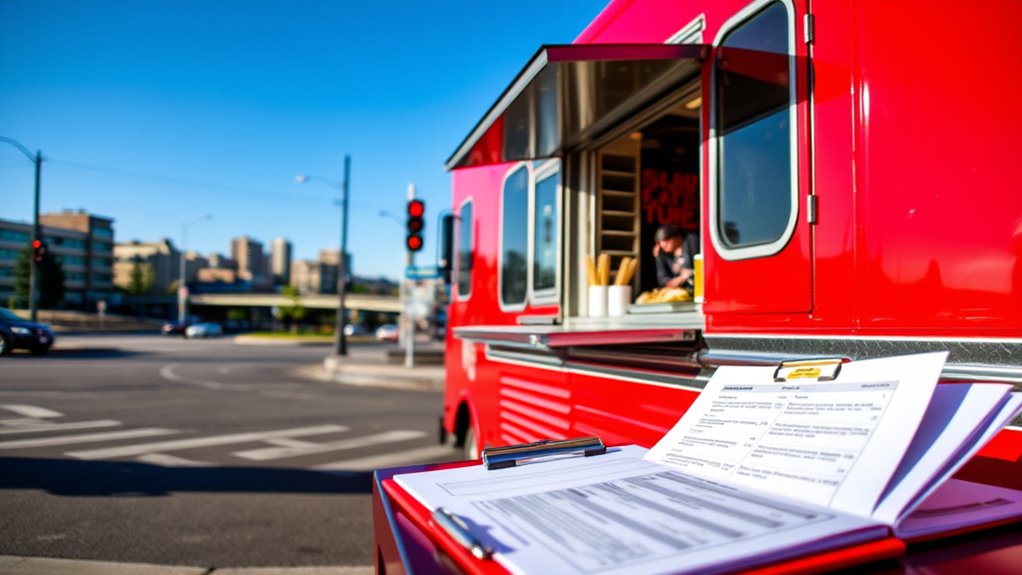
Navigating permits and licensing requirements in Spokane can seem complex, but understanding the process is essential for operating your food truck legally. First, you need a Temporary Food Establishment Permit from the Spokane Regional Health District (SRHD). Submit your application at least 14 days before you plan to start. If you’re working with an approved commissary, you’ll also need a commissary agreement. Your mobile unit must pass SRHD inspections to meet health standards. Additionally, you might need approval from Labor & Industries (L&I), especially if your truck involves special systems like electrical or water. Your truck must also be licensed as a vehicle, and you’ll need a Mobile Food Vendor Permit from the City of Spokane, which requires proof of insurance and business registration. Being thorough ensures compliance and smooth operation. Construction near the SRHD building on College Avenue may temporarily impact inspection scheduling and availability. Also, understanding health and safety regulations is crucial to ensure your food truck meets all legal requirements and provides a safe environment for customers.
Understanding the Costs Involved in Starting Your Food Truck Business
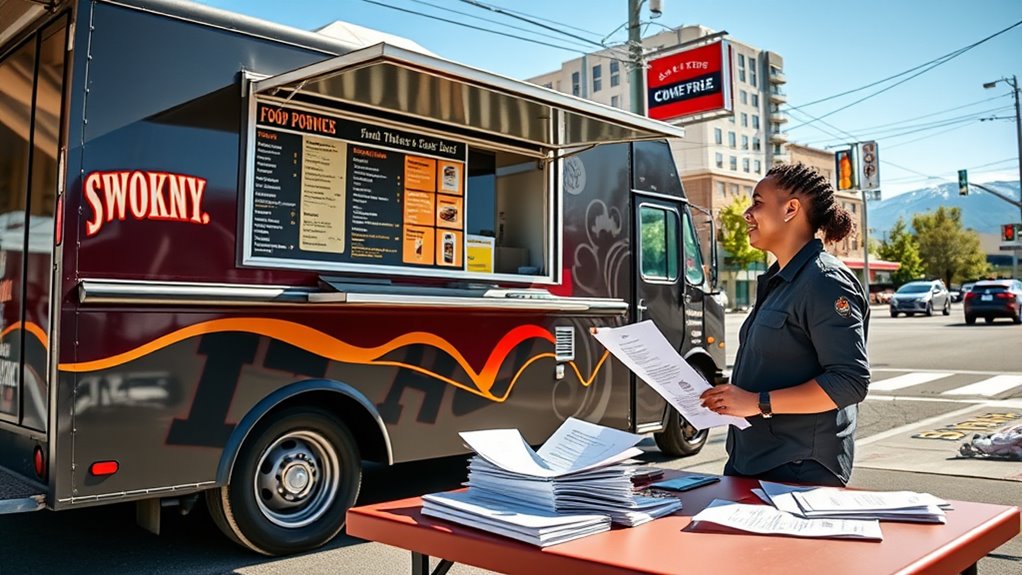
Starting a food truck business involves significant upfront investment and ongoing expenses, so understanding the costs is essential to planning your venture. You’ll need to budget $20,000 to $150,000 for a truck, depending on whether it’s used or new, plus $10,000 to $75,000 for kitchen equipment like grills and refrigeration. Initial inventory, serveware, and branding costs range from $4,000 to $15,000. You should also account for $2,000 to $10,000 for point-of-sale hardware and signage, and $500 to $5,000 for commissary setup or fees. Recurring costs include food supplies, labor, fuel, maintenance, insurance, and permits. Local fees for Spokane health inspections, fire safety, licensing, and permits vary, so plan accordingly to cover these ongoing regulatory expenses. Understanding bedroom design elements can help create a welcoming environment for staff or customers who visit your food truck or base of operations.
Choosing Prime Locations for Maximum Visibility and Customer Engagement
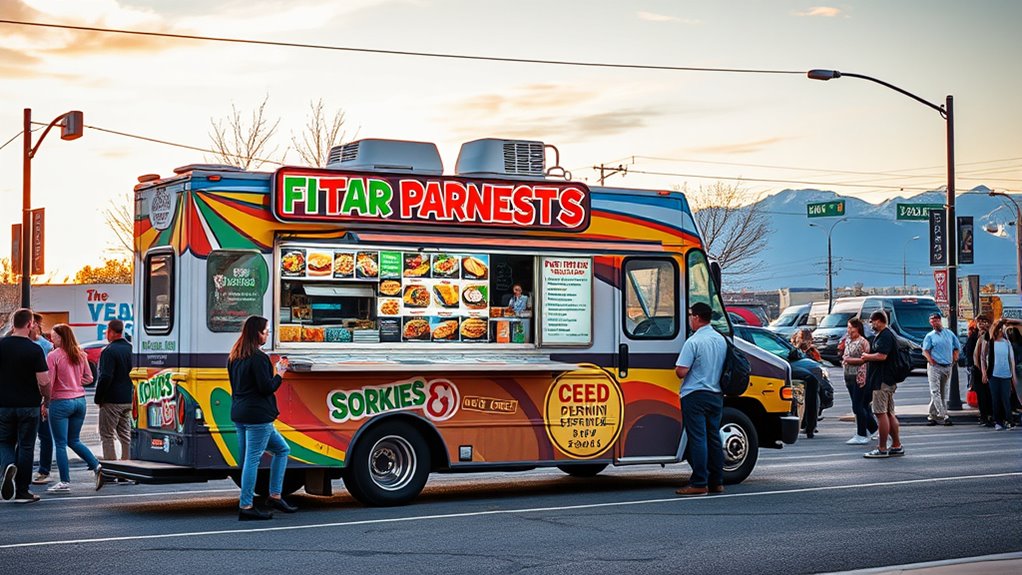
Choosing the right locations can make or break your food truck’s success. Focus on high-foot-traffic areas like Riverfront Park during festivals or weekends, especially on days with scheduled events. Downtown Spokane office corridors, such as Post–Street/Desmet and 1st–Main, draw lunchtime crowds from nearby workers. Near Gonzaga University on 10th & Maple, you’ll find steady traffic from students and staff. Event nights at Spokane Arena or the INB Performing Arts Center create predictable surges—align your hours to these schedules. Parks like Manito attract families on weekends, ideal for spring and summer. Consider food truck pods and private lots with built-in foot traffic, but verify parking and permit restrictions first. Corner spots and locations facing main roads boost visibility and customer engagement markedly. Additionally, choosing locations near popular attractions like Water Parks can help attract visitors seeking refreshment and quick bites during their visit.
Developing a Delicious and Compliant Menu to Attract Customers
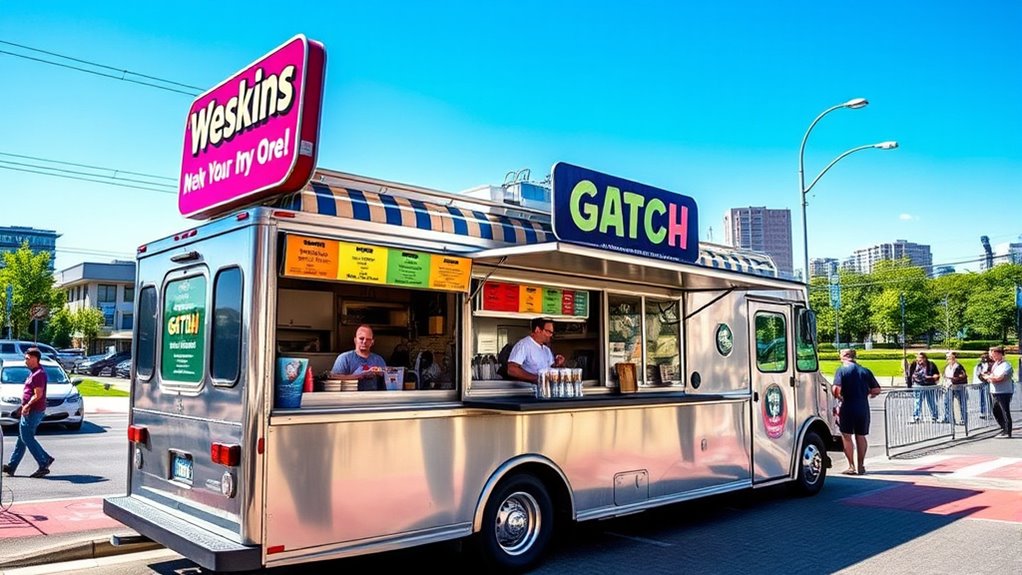
To attract customers and stay compliant, designing a menu that fits your mobile operation is essential. Focus on dishes you can prepare and serve entirely within your truck, with short cook and assembly times to keep the line moving during busy events. Use durable ingredients that tolerate temperature changes to minimize waste and food safety risks. Include 2–3 signature items and 2–4 rotating specials to build your brand while managing inventory. Clearly label allergens and ingredients for customer safety and quick service. Incorporate ingredients that are fresh and seasonal to appeal to local tastes and ensure ingredient availability. Create mouthwatering signature dishes that leave a lasting impression. Incorporate seasonal, local ingredients that showcase your region’s flavors. Design a menu that’s easy to prep and serve on the go. Prioritize safety with clear allergen labeling. Keep your menu flexible to adapt to Spokane’s vibrant seasonality. Remember to plan your menu around local ingredient availability to ensure freshness and cost-effectiveness throughout the year.
Effective Marketing Strategies to Boost Your Food Truck’s Popularity
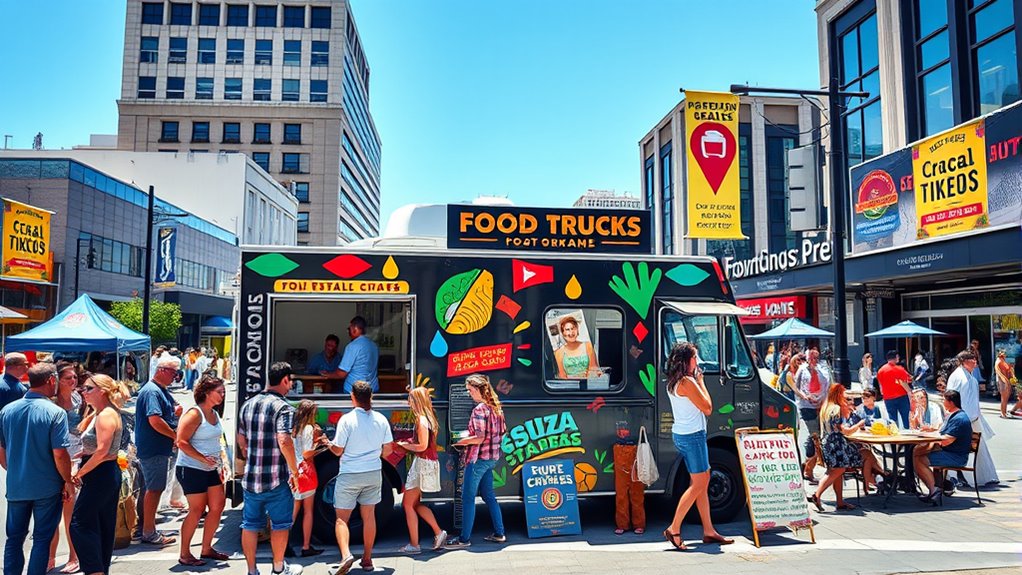
Effective marketing is essential for boosting your food truck’s visibility and attracting more customers. Focus on short-form videos on TikTok and Instagram Reels to increase discovery, as they drive the highest engagement rates in 2024–2025. Maintain a consistent posting schedule and update your location in real-time; trucks that share live updates see higher foot traffic. Use high-quality food photos and behind-the-scenes clips to showcase your brand personality, encouraging higher spend per customer. Implement platform-specific calls-to-action, like “Find truck now” on Instagram Stories, to convert views into visits. Track engagement metrics such as reach, saves, and clicks, then refine your content based on top-performing posts. Partner with local events and optimize your online listings to maximize your food truck’s popularity and customer loyalty. Digital marketing efforts can significantly improve your visibility, as data shows that trucks with strong online presence experience a 20% increase in repeat sales. Incorporating insights from home theatre projectors, such as leveraging visual appeal and targeted content, can also help craft more engaging marketing visuals.
Frequently Asked Questions
What Are the Specific Health Code Standards for Food Trucks in Spokane?
You need to follow Spokane’s health code standards for food trucks, which require compliance with chapters 1–8 of the 2001 FDA Food Code and WAC 246-215. Confirm all staff handling unwrapped foods hold a valid Washington Food Handler Permit. Your unit must have approved potable water, proper waste disposal, and handwashing facilities. Equipment must meet safety standards, and periodic health inspections are mandatory to keep your operation compliant and safe for customers.
How Do I Find Private Property Owners for Vending Locations?
To find private property owners for vending locations, start with Spokane County Assessor records online to identify property owners by parcel or address. You can also check Spokane County Auditor’s deed database for recent ownership transfers. For commercial sites, use vendors like CoStar or LoopNet to access ownership info. On-site signage or property management offices often list contact details. Reach out with a clear proposal, including your plans and permits, to secure necessary permissions.
What Insurance Coverage Is Recommended for Food Truck Operations?
You should get extensive insurance coverage for your food truck. This includes general liability to protect against customer injuries and property damage, and product liability for food-related claims. Also, secure commercial auto insurance to cover your vehicle, including collision and theft. Don’t forget workers’ compensation if you have employees, and consider crime insurance for cash-heavy operations. These coverages help safeguard your business from common risks in mobile food service.
Are There Any Restrictions on Operating Hours for Food Trucks?
Think of your food truck as a lively performer on a stage, with hours set by the script of local rules. Spokane’s regulations act like the spotlight and curtain, guiding your show. You must follow permitted hours, which can be limited by zones, health and safety rules, and special event permissions. Ignoring these can lead to fines or permit revocation, so stay in the spotlight and operate within the script.
How Can I Obtain Permits for Seasonal or Special Event Vending?
To get permits for seasonal or special event vending, you need to apply through the Spokane Regional Health District for a Temporary Food Establishment (TFE) permit at least 14 days before your event. Additionally, you must submit the correct application to Spokane’s Taxes & Licenses for a Mobile Food Vendor permit, pay the $60 fee, and provide proof of business registration, insurance, and health inspections. make certain you follow all zoning and location rules.
Conclusion
Starting your food truck in Spokane is like assembling a trusty ship—navigation, permits, location, menu, and marketing all steer you toward success. Stay organized, adapt to the local vibe, and don’t forget to keep your menu tasty and compliant. With a bit of elbow grease and a sprinkle of ingenuity, you’ll be serving up delicious eats and making waves. Before you know it, your food truck will be the talk of the town, just like a true modern-day tavern on wheels.
